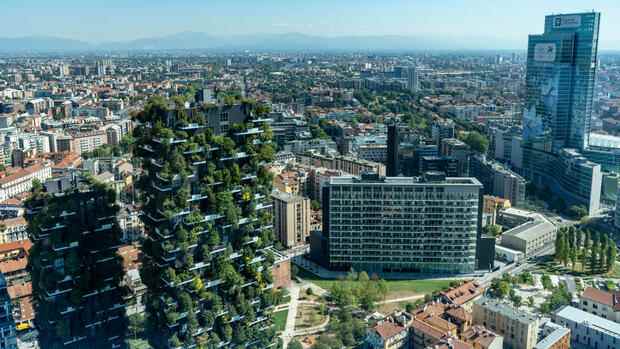Vatican City Italy’s industry association has chosen a very special location for its annual meeting: the Vatican Audience Hall, in the middle of the Papal States, a huge sculpture of Jesus towers over the marble stage. “Our economy is doing better than that of our German and French friends,” says Confindustria boss Carlo Bonomi. But there are also many uncertainties: pandemic, war in Ukraine, energy security, the “return of nationalist sirens”.
Then the Pope comes into the hall and speaks to the more than 4,000 entrepreneurs and company bosses. Francis praises them as an “essential component” in building the common good, as “the engine of development and prosperity.” It’s almost as if Italy’s economy is in need of heavenly help right now, with soaring inflation, skyrocketing energy prices and a looming recession.
Added to this is the uncertain political situation: a new parliament will be elected in Rome in a week and a half. According to recent polls, a right-wing coalition could then form the government, led by Giorgia Meloni, head of the post-fascist Fratelli d’Italia. Then there are the right-wing Lega and the centre-right party Forza Italia led by ex-Prime Minister Silvio Berlusconi.
Italy’s exports have long been above the pre-corona level
Despite all the doubts, there are many indicators that currently speak in favor of Italy: the economy is growing faster than in the rest of the euro zone. In the second quarter, the gross domestic product increased by 1.1 percent, compared to the same quarter of the previous year it is even 4.7 percent. Both industry and the service sector have made strong gains.
Top jobs of the day
Find the best jobs now and
be notified by email.
Economist Lorenzo Codogno believes this will help Italy avoid a full-blown recession. “The Italian economy performed better than expected in the second quarter,” he says. On the one hand, this is due to the government’s solid budgetary policy and the billions in money from the EU recovery fund. “But also from an increase in private investment and a boom in tourism.”
>> Also read here: Unemployment rate in euro area falls to record low
The trade balance also speaks for the third-largest economy in the euro zone: In the first half of the year, the value of exported goods was 22 percent higher than in the same period last year, also driven by price increases. While business with Russia has declined, exports to Turkey, Belgium and the USA have increased by around a third. For comparison: Germany imported goods worth 39.5 billion euros from Italy, an increase of 18 percent.
The unemployment rate has recently fallen further to 7.9 percent. Compared to July 2021, another 463,000 people have found a job. The Italian statistical office Istat expects the economy to grow by 3.5 percent this year.
And even when it comes to energy, Italy is in a better position than Germany, for example: The gas storage facilities are around 84 percent full. New energy agreements, such as with Algeria or Qatar, have rapidly reduced dependence on Russian natural gas. The government also decided at the weekend to double national gas production.
Confindustria President Carlo Bonomi thanks Pope Francis for his speech.
(Photo: AP)
In Rome, it is currently not assumed that companies will have to be shut down in winter. “If there is no gas rationing for the production plants, Italy could continue to outperform the euro zone,” says Codogno. GDP growth of 1.1 percent is therefore also predicted for 2023. Nevertheless, Confindustria boss Bonomi warns. “If we have to stop the companies, thousands of jobs and families are at risk.”
The energy crisis hits all companies hard. It doesn’t matter which sector you look at: “Gas bills have quadrupled within a year,” says Bonomi. There are already temporary shutdowns, and some companies are being forced to adjust production times. Confesercenti, the association of the self-employed, expects electricity and gas bills of eleven billion euros in the next twelve months for the smaller companies. The association warns that around 90,000 companies are threatened with bankruptcy. The business association Confcommercio recently warned that 120,000 companies were under acute threat.
Companies hope for recovery funds
“It is important that the new government continues with the recovery fund plan. This is fundamental for companies, especially in the south,” says Francesco de Stefano, who owns a logistics company in Naples. “There are a few doubts about that.” After all, there hasn’t been a centre-right government in Italy for twelve years.
>> Also read here: The stoppable rise of the right-wing populists
“The election doesn’t scare me, it’s the expression of democracy,” says Andrea Piantini, head of the industrial association for ship mechanics. “I’m only afraid of an election outcome that produces a majority that doesn’t manage to govern.”
What almost all election programs have in common are tax cuts. “In the election campaign everyone seems to agree, we’ve been asking for it for years,” says Confindustria boss Bonomi. The only question is whether something actually happens after the election. Bonomi does not see the high national debt as a major problem as long as growth is right.
In general, however, he questions what all the debt has brought about in recent years. “In ten years we have borrowed EUR 800 billion more. Did we solve Italy’s problems with this? No.”
More: These are the promises of Italy’s right – and that’s how much they cost
